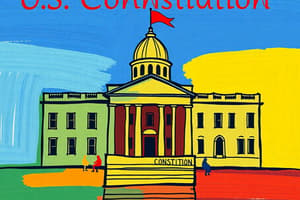Podcast
Questions and Answers
What was a significant outcome of the US participating in both World Wars?
What was a significant outcome of the US participating in both World Wars?
- It emerged as a global superpower. (correct)
- It contributed to the founding of the UN.
- It faced severe economic decline.
- It became isolated from global affairs.
Which branch of the US government is responsible for interpreting laws?
Which branch of the US government is responsible for interpreting laws?
- Judicial branch (correct)
- Administrative branch
- Executive branch
- Legislative branch
What is the primary purpose of the United Nations?
What is the primary purpose of the United Nations?
- To maintain international peace and security. (correct)
- To establish a global military force.
- To enforce international law through punishment.
- To regulate global trade policies.
Which constitutional principle helps prevent any one government branch from becoming too powerful?
Which constitutional principle helps prevent any one government branch from becoming too powerful?
What role does the US typically play in international organizations?
What role does the US typically play in international organizations?
The US Constitution can be modified through what process?
The US Constitution can be modified through what process?
Which of the following is a key body within the United Nations?
Which of the following is a key body within the United Nations?
What was a major event in US history that shaped its development?
What was a major event in US history that shaped its development?
Flashcards
United States History Overview
United States History Overview
The United States, formed from 13 British colonies, developed through westward expansion, industrialization, and immigration. It played a significant role in both World Wars and emerged as a global superpower in the 20th century. The US has a complex relationship with other nations characterized by alliances, conflicts, and evolving global roles.
US Government Structure
US Government Structure
The US government is divided into three branches: legislative, executive, and judicial. The Congress makes laws, the President enforces them, and the Supreme Court interprets them. These branches have checks and balances to prevent any one from becoming too powerful.
US Role in International Relations
US Role in International Relations
The United States actively participates in international organizations and agreements. It promotes cooperation among nations and is a strong advocate for multilateralism. The US engages in diplomacy, conflict resolution, and maintains alliances and partnerships.
United Nations Overview
United Nations Overview
Signup and view all the flashcards
What is the Congress?
What is the Congress?
Signup and view all the flashcards
What is the President's role?
What is the President's role?
Signup and view all the flashcards
What does the Supreme Court do?
What does the Supreme Court do?
Signup and view all the flashcards
What is the US Constitution?
What is the US Constitution?
Signup and view all the flashcards
Study Notes
United States History Overview
- The United States, formed from 13 British colonies, developed through westward expansion, industrialization, and immigration.
- Key figures and events shaping the nation include the American Revolution, the Civil War, and various economic booms and busts.
- The US played a pivotal role in both World Wars, emerging as a global superpower in the 20th century.
- The nation has experienced periods of social and political reform, including the Civil Rights Movement and the fight for women's suffrage.
- The US has a complex relationship with other nations, characterized by alliances, conflicts, and evolving global roles.
United States Government Structure
- The US has a federal government system, dividing power between the three branches: legislative, executive, and judicial.
- The Congress (legislative branch), composed of the House of Representatives and the Senate, creates laws.
- The President (executive branch) enforces laws and commands the military.
- The Supreme Court (judicial branch) interprets laws and ensures they align with the Constitution.
- Checks and balances between these branches help prevent any one from becoming too powerful.
- The US operates under a republican form of government, with elected representatives.
- The Constitution is the supreme law of the land, outlining the principles and structure of the government.
- Various amendments modify the Constitution to address societal changes.
Role of the United States in International Relations
- The United States plays a significant role in international organizations and agreements.
- The US is a strong advocate for multilateralism and international cooperation in many areas.
- The nation often undertakes efforts in diplomacy and conflict resolution.
- The US has a vast network of international alliances and partnerships.
- The US has a complex relationship with global political and economic issues.
United Nations Overview
- The United Nations is an intergovernmental organization, aiming to maintain international peace and security.
- The UN promotes cooperation among nations in addressing global challenges.
- The UN consists of various bodies, including the General Assembly, the Security Council, and the Secretariat.
- Member states of the UN coordinate on many issues.
- The UN works to promote human rights, sustainable development, and humanitarian aid.
- The UN provides a platform for countries to discuss and address international matters together.
- The UN faces challenges in maintaining peace and security in conflict zones around the world.
- The UN's effectiveness depends on the cooperation and commitment of its member states.
United States and the United Nations Relationship
- The US is a founding member of the UN and a significant contributor.
- Historically, the US has been an important voice and force in the UN system.
- The US has supported many UN initiatives, though U.S. involvement has fluctuated due to shifting priorities and domestic political considerations.
- The US and the UN occasionally have differing perspectives on international issues.
- The US often cooperates but sometimes disagrees with other countries and organizations based on its own priorities.
Studying That Suits You
Use AI to generate personalized quizzes and flashcards to suit your learning preferences.




